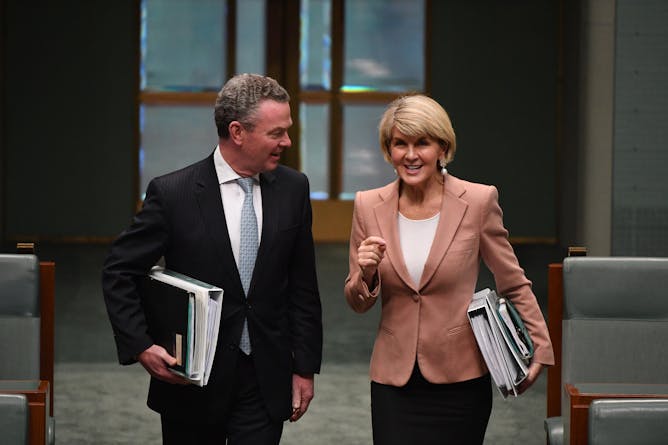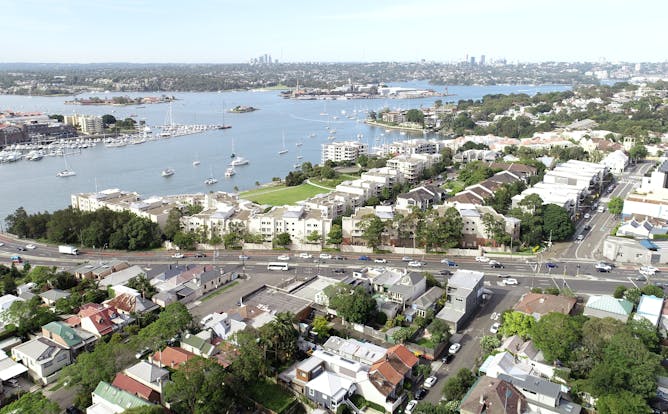|
|
|
Editor's note
|
|
They call it the “revolving door” – when a government minister leaves parliament and then, shortly thereafter, pops up in a related job in the outside world. Former Liberal ministers Christopher Pyne and Julie Bishop are the latest to have raised eyebrows in this regard, to the extent that the Senate is conducting an inquiry into the matter.
But whatever it might conclude, writes George Rennie, Australia’s lobbying regulation regime remains hopelessly ineffective. A quid pro quo arrangement is hard to prove, and even if it was, there would probably be little that would be done about it.
While genuine reform on this issue is not easy it is vital – all that’s needed now is the political will to do so.
|
Amanda Dunn
Section Editor: Politics + Society
|

|
|
Top stories
|

Former ministers Christopher Pyne and Julie Bishop have appeared before a Senate committee to defend their post-parliamentary jobs.
AAP/Mick Tsikas
George Rennie, University of Melbourne
Australian politics' 'revolving door' is undermining efforts to counter lobbying and potential corruption, and the regulation system is hopelessly flawed.
|

Footprints aren’t always as clear as this - but they nevertheless have their uses.
Eddies Images/Shutterstock.com
Claude Roux, University of Technology Sydney
The debate about the reliability of forensic evidence reflects a lack of understanding of how forensic science is best used in the justice system, rather than a problem with forensic science itself.
|

Allowing residents to remove trees within three metres of buildings or ‘ancillary structures’ could dramatically alter the green infrastructure of dense inner Sydney suburbs like Rozelle.
Tom Casey/Shutterstock
Sara Wilkinson, University of Technology Sydney; Agnieszka Zalejska-Jonsson, KTH Royal Institute of Technology; Sumita Ghosh, University of Technology Sydney
Greater urban density is making it harder to preserve, let alone increase, tree cover. It's vital, then, to demonstrate the full value of green infrastructure for healthy liveable cities.
|

Every reference but one to inequality nearly doubling was removed from an Australian Institute of Health and Welfare report.
Shutterstock
Peter Saunders, UNSW
The Institute for Health and Welfare issued an "errata" to correct statements about inequality that were perfectly correct.
|
Health + Medicine
|
-
Sandra Jones, Australian Catholic University
The myth that children grow out of autism can prevent parents from seeing and accepting their child as the wonderful human being they are and recognising their strengths.
-
Sunanda Creagh, The Conversation; Alexandra Hansen, The Conversation
A professor in nutrition and dietetics explains.
-
Suzanne Mahady, Monash University
Bowel cancer is one of the most common forms of cancer in Australia, and some cases could potentially be avoided. Here's how.
|
|
Environment + Energy
|
-
Ian McGregor, University of Technology Sydney
Ice cream company Ben & Jerry's will close its Australian stores for this month's global climate strike and pay staff to attend the protest, telling customers "if it's melted, it's ruined".
-
Troy Baisden, University of Waikato
Regenerative agriculture has the potential to build production and reducing pollution, but it needs a clearer definition.
-
Dale Dominey-Howes, University of Sydney
Climate change makes every risk factor for major bushfires worse, which means massive, intense fires will only become more likely.
|
|
Arts + Culture
|
-
Sandra Gattenhof, Queensland University of Technology
As comparisons are made between the finances of private and public schools, investment in a creative education for all should be prioritised.
|
|
Politics + Society
|
-
Michelle Grattan, University of Canberra
Moderate Liberal Russell Broadbent, says mandatory sentencing interferes with separation of powers, and removes the option for judges to take particular circumstances of cases into account.
-
Renae Barker, University of Western Australia; Robyn Olive Carroll
Sometimes aggrieved parties simply want an apology, and this would be an important provision under the draft legislation.
-
Michelle Grattan, University of Canberra
The former public service commissioner said the relationship between ministers and the Australian public service has transformed from a partnership to one more like “master-servant”.
|
|
Science + Technology
|
-
Rebecca Allen, Swinburne University of Technology
Despite a last-minute crash-landing, efforts behind India's moon mission should be applauded. The endeavor has set an example for emerging space programs across the globe.
|
|
| |
Featured jobs
|

|
CSIRO — Floreat, Western Australia
|

|
University of Western Australia — Perth, Western Australia
|

|
RMIT University — Melbourne, Victoria
|

|
Charles Sturt University — Wagga Wagga, New South Wales
|
|
|
|
| |
| |
| |

|
| |
| |
| |
Featured events
|

|
Clayton Campus, Clayton , Victoria, 3800, Australia — Monash University
|

|
RD Watt Seminar Room, RD Watt Building, City Road, University of Sydney , Camperdown , New South Wales, 2006, Australia — University of Sydney
|

|
The University of Sydney, Sydney , New South Wales, 2006, Australia — The Australian Prevention Partnership Centre
|

|
The University of Sydney, Camperdown, New South Wales, 2006, Australia — University of Sydney
|
|
|
|
| |
| |
| |
| |
| |
|
|
|
|
|
|
|